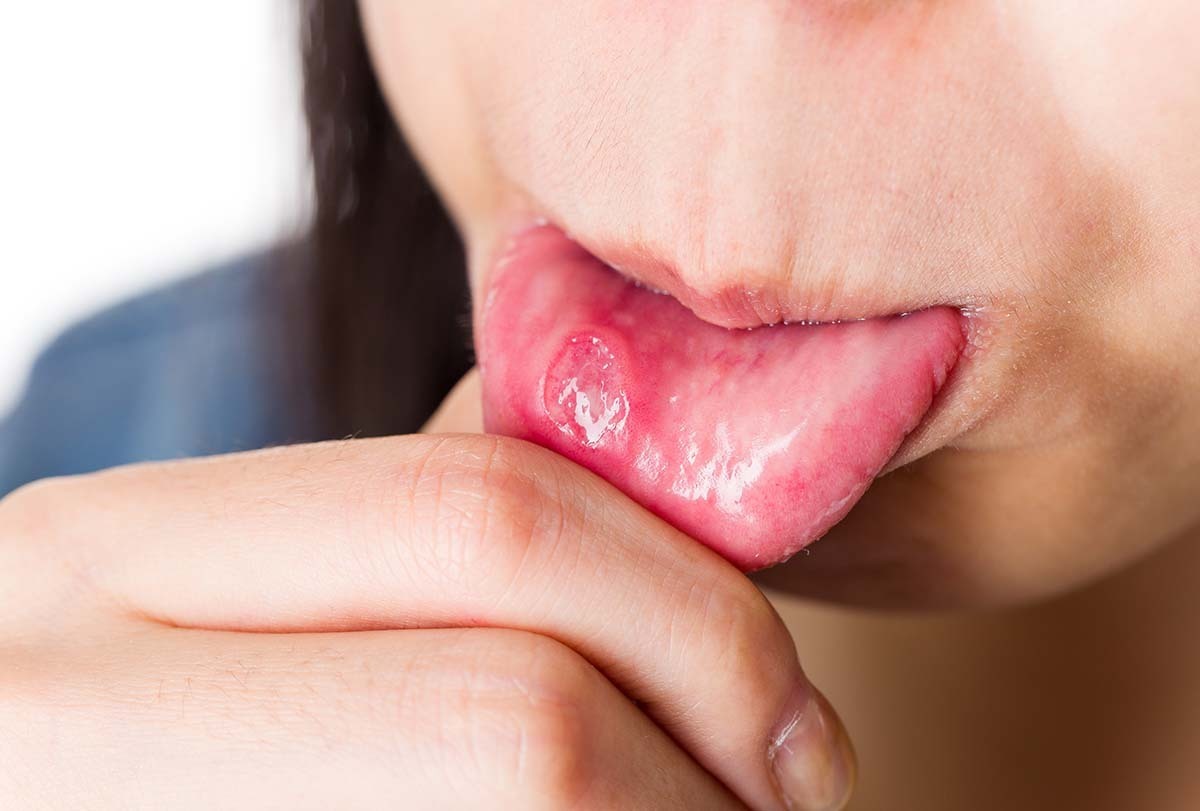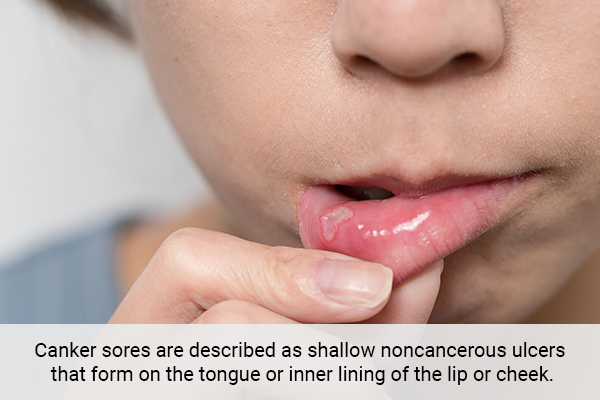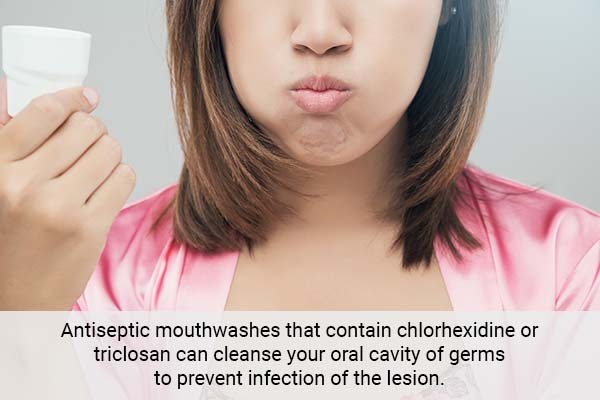In this article:
Canker sores are painful ulcers inside the mouth that usually go away on their own within a few days or weeks. Fortunately, there are things you can do to make them hurt less and heal faster.

This article will take you through the causes, symptoms, and treatments of this relatively common condition.
Causes and Risk Factors Responsible for Canker Sores
Most cases of canker sores are idiopathic, that is, without a known cause. However, the following factors can trigger or make you prone to them:
- Damage to the soft tissue inside the cheeks or back of the lips due to accidental bites, burns from scalding-hot food/beverage, or friction from braces
- Hormonal fluctuations during the menstrual cycle
- Genetics or family history
- Sensitivity or allergy to certain foods such as gluten (celiac disease), eggs, cheese, nuts, and coffee (1)
- Weakened immunity due to conditions such as HIV/AIDS and herpes or other reasons
- Exposure to sodium lauryl sulfate often found in toothpaste
- Consuming foods or drinks that are too spicy or acidic
- Deficiency of certain nutrients such as iron, vitamin B12, and folic acid
- Dehydration
- Stress or anxiety (1)
- Certain preexisting medical conditions, especially inflammatory bowel diseases such as ulcerative colitis and Crohn’s disease
- Certain medications and medical treatments (2)
Signs and Symptoms of Canker Sores

Canker sores are described as shallow noncancerous ulcers that form on the tongue or inner lining of the lip or cheek. This ulcer is the main symptom and is marked by the following characteristics:
- A burning or tingling sensation is often felt at the site of occurrence before the sore develops.
- The size of the ulcer can vary from small to large, but it is usually less than 1/3 inch or 1 centimeter in diameter. (3)
- The lesion tends to be swollen and painful, which can make it difficult for you to eat or talk. The pain may subside after 7–10 days as the sore starts healing.
- Canker sores have a red boundary and base enclosing a pus-filled yellow center. They may begin as a tiny red bump but grow to become an open ulcer.
- As the sore begins to heal, it acquires a grayish color.
- Some people may get multiple canker sores at a time. (4)
- Canker sores tend to come back, which means you may develop another sore at the same spot after the first one goes away.
- Minor canker sores generally resolve within 1–3 weeks, but larger ones can take up to 6 weeks to heal completely. (5)
- These lesions rarely leave behind a scar.
- Canker sores are not contagious and do not spread through saliva.
Less common symptoms include:
- Fever
- General discomfort or uneasiness (malaise)
- Swollen lymph nodes
Treatment for Canker Sores
Most canker sores develop spontaneously without an identifiable cause. Thus, treatment for this condition does not target the cause but aims to relieve its symptoms, promote healing, and prevent recurrence. (6)
No single intervention can fulfill all these goals of treatment, but a combination of therapeutic agents can be used to get maximum relief. These include prescription and over-the-counter (OTC) preparations.
Some of the commonly used medications for canker sores are gels, creams, and mouthwashes to relieve the pain. In severe cases, steroid tablets may be considered.

- Nonsteroidal anti-inflammatory drugs (NSAIDs) such as diclofenac can reduce the pain, swelling, and redness in the ulcer. (7)
- Antiseptics mouthwashes that contain chlorhexidine or triclosan can cleanse your oral cavity of germs to prevent infection of the lesion. (8)(9) Hydrogen peroxide 3% solution mixed with equal amounts of water can also be used as a mouth rinse or applied directly to the ulcer to remove any germs from its surface.
- Occlusive agents or emollients may be applied directly to the ulcer or on top of another therapeutic agent to keep it in place. This protective coating helps block out irritants that can further damage or irritate the lesion and underlying nerve endings.
- Local anesthetics such as lidocaine and benzocaine can numb the underlying nerve endings to make the lesion hurt less. They are available in the form of gel or cream. Benzocaine 5%–20% is the most widely used numbing agent for canker sores, but it is recognized as an allergen and is not recommended for those with hypersensitivity. (10)
- Steroids are used in severe cases when NSAIDs, antiseptics, and local anesthetics fail to clear the lesion and provide relief. You may start with a topical steroid, and shift to steroid tablets if even that doesn’t work. You will need a prescription from the doctor for steroid medication, and it is very important to use them in the correct dosage as steroid overuse can result in many side effects.
- Cauterization is the last resort when all other measures fail to heal the canker sore. This is a clinical procedure that involves using a chemical (silver nitrate solution) or electrical current (laser) to destroy the inflamed tissue. (9)
Diagnosing Canker Sores
Doctors can generally identify a canker sore simply by looking at it because of its unique appearance.
But they may order a few additional tests to confirm the diagnosis and eliminate other causes of the ulcer. (11) These include:
- Blood work
- Cultures of the mouth ulcer
- Biopsy of the lesion
When to See a Doctor

Canker sores generally don’t warrant medical attention, but contact your doctor in the following cases:
- If you develop a fever
- If the pain is unbearable, which could be a sign of infection
- If you get a cluster of sores
- If the sore persists for more than 2 weeks
- If the ulcer expands to your lips
- If it hurts to speak, eat, or drink because of the sore
- If the sore is abnormally large, red, or swollen, which could point to an infection
- If the sore starts oozing discharge, which could be a sign of infection
- If the sore is originating from a tooth
Final Word
Canker sores are benign but painful lesions that usually resolve on their own without the need for medical consultation or treatment.
You can use a few OTC interventions to manage the symptomatic discomfort, speed up healing, and keep the sore from coming back. In severe or chronic cases, you need to visit the doctor for prescription steroids.

- Was this article helpful?
- YES, THANKS!NOT REALLY


